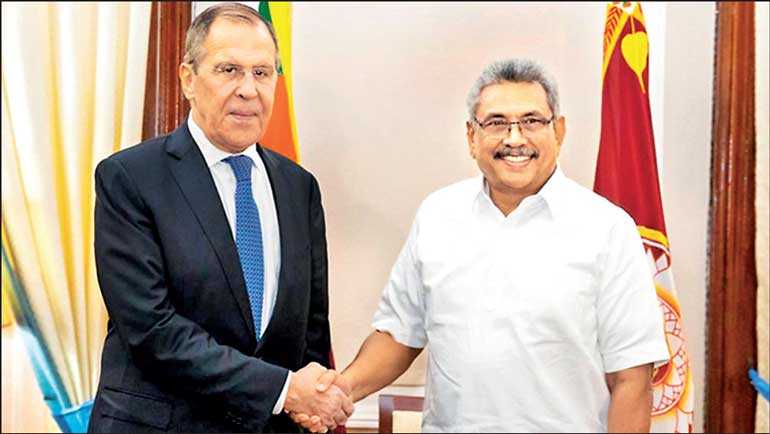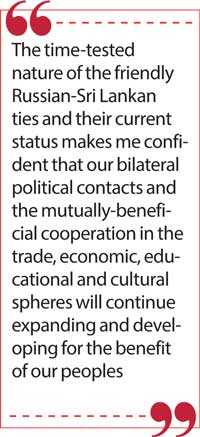Saturday Feb 21, 2026
Saturday Feb 21, 2026
Friday, 12 June 2020 00:00 - - {{hitsCtrl.values.hits}}

Today, 12 June, we celebrate our National Holiday – Russia Day. It is a great pleasure to congratulate all the compatriots as well as our Sri Lankan friends on this solemn occasion.
This day the Russian people rejoice over strong patriotic sentiments and respect for the Fatherland, a country with a 1,500-year-old history, unique legacy, and culture, which has united a multitude of peoples, religions and languages.
The celebrations of the Russia Day are being held against the background of the Year of Remembrance and Glory declared by Russian President Vladimir Putin in honour of the 75th Anniversary of Victory in the Great Patriotic War over the Nazi Germany.
On this occasion a military parade will be held on the Red Square on 24 June, the same day as the 1945 historical Moscow Victory Parade, and on 26 July – the Immortal Regiment in commemoration of our heroes who fought in the war.
We have been going through numerous critical times and severe trials. But our people met all challenges with dignity and honour. 12th June is a symbol of free and future-oriented Russia, successful development of its economy, improvement of social security, consolidation of the friendship of the peoples of the Russian Federation, utmost promotion of democracy, strengthening of its position on the international arena as well as of great victories and accomplishments of many generations of our predecessors. The aforesaid has laid the basis for the inviolable sovereignty of our State and established a reliable foundation for the protection of our national interests.
The modern world is experiencing deep transformation. The rapid spread of the novel coronavirus changed life on the planet virtually overnight. It also became a crush test for international relations, both at the level of individual countries and multilateral associations. The obvious consequences of the pandemic include an economic recession, a crisis of global governance and the growth of protectionist and isolationist sentiments.
The pandemic has seriously limited humanitarian, cultural and tourist exchanges, as well as people to people contacts. Now it is high time for collective, collaborative actions in order to find adequate solutions to this global issue. The well-being of citizens of all states without exception depend on it.
The objective of Russian foreign policy is to contribute to the creation of sustainable world system based primarily on the equality of all participants and non-interference in internal affairs, while maintaining the supremacy of international law in the world arena, declaring full support for United Nations’ decisions and avoiding their unilateral and arbitrary interpretation, especially in the situation of the COVID-19 pandemic. The essence of the transformation should be in the creation of a multipolar system of international relations.
Russia is pursuing a multidimensional foreign-policy approach. We are open for cooperation on the principles of equality and respect for mutual interests. Russia has put much effort into the formation of flexible target-oriented alliances with its active involvement.
South Asia and Asia-Pacific region remains one of the key priorities of our foreign policy. Russia is not only a European but also an Asian country, due to its geographical position, history, cultural and religious links with the East, thus becoming a natural bridge between the East and the West.
Our country is a prominent member of regional multilateral and trans-regional organisations such as the Eurasian Economic Union, BRICS (Brazil, Russia, India, China, South Africa), the Shanghai Cooperation Organisation, the Association of Southeast Asian Nations Regional Forum, the Asia Cooperation Dialogue. All these alliances represent the overwhelming majority of the Globe and serve as a link between Europe and Asia, promoting economic cooperation with Asian countries.
One of our closest partners and friends in the South Asian region is the Democratic Socialist Republic of Sri Lanka. The diplomatic relations between the two countries were established on 19 February 1957. Our long-lasting ties, fruitful and extensive exchanges in different spheres take roots in shared multicultural, multinational and multi-religious landscape. Russia has always supported and backed Sri Lanka in all international fora, particularly in the United Nations Human Rights Council, as well as the Sri Lankan efforts in UN Peacekeeping Missions.
In recent years, relations between our countries have developed a good pace. The latest example of our ever-growing partnership is the working visit of the Minister of Foreign Affairs of Russia Sergey Lavrov to Sri Lanka on 14 January. The Russian Foreign Minister met with the President Gotabaya Rajapaksa, Prime Minister Mahinda Rajapaksa and Minister for Foreign Relations Dinesh Gunawardena. The visit of the Russian Foreign Minister is a major event that will give further impetus to the bilateral cooperation and will contribute to our time-tested friendship.
The establishment of the Intergovernmental Commission on Trade, Economic, Scientific and Technological Cooperation and its two sessions held in Moscow (February 2016) and Colombo (October 2017) are significant steps in development of our economic ties.
As of 2019 the Russian export to Sri Lanka amounted to just under $ 400 million, imports – almost $ 290 million. Russia continues to be one of the largest consumers of Ceylon tea.
Since 2015 Russia and Sri Lanka have signed a number of bilateral agreements in various fields of cooperation such as fisheries, tourism, culture, space research and many others. Such a solid base of the legal framework of our bilateral relations has provided for a good opportunity to bring the Russian-Sri Lankan ties to a new level.
Russia and Sri Lanka have always valued the importance of education for young men and women. Thousands of Sri Lankans obtained their degrees in various universities in Russia and the former Soviet Union. During the past six decades, Sri Lankans who have graduated from Soviet and Russian universities became researchers, doctors, and engineers. Thanks to the efforts of the Russian Cultural Centre in Colombo every year we expand the educational opportunities for Sri Lankans by increasing the number of scholarships.
Russia has been outraged by the inhuman terrorist attacks on 21 April 2019 and has extended its full support to the Sri Lankan Government. The tragic events in Sri Lanka confirm the need to consolidate the efforts of the international community to fight international terrorism. We are ready to share our experience with Sri Lanka.
The time-tested nature of the friendly Russian-Sri Lankan ties and their current status makes me confident that our bilateral political contacts and the mutually-beneficial cooperation in the trade, economic, educational and cultural spheres will continue expanding and developing for the benefit of our peoples.
Unfortunately, this year we have no opportunity to hold a reception on the occasion of our National Day. But I would like to assure our Sri Lankan friends that Russia will continue to pursue the policy of strengthening our bilateral relations in all fields.
(The writer is the Ambassador of the Russian Federation to Sri Lanka.)